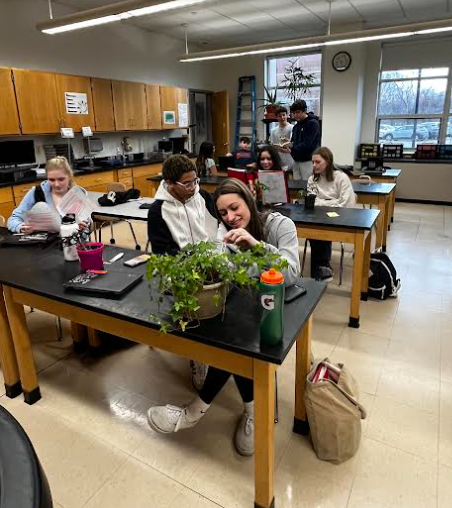Covid-19’s lasting effect on business
October 28, 2020
COVID-19 took the entire world by surprise but no one felt the impact of the virus like businesses and the economic effect is undeniable. Many aspects important to a business’s smooth operation were affected by this virus, forcing many to shut down temporarily.
Only a few short weeks into quarantine, mass layoffs were already starting to go into effect; with no end in sight many small businesses began to look to the federal government for aid. To get a better look at the effectiveness and transparency of the government response I reached out to my boss and owner of The Homestead restaurant, Steve Thole. When asked about how COVID-19 affected his businesses plan, he said, “We just plan on doing more to-go orders, and we are unable to effectively make long term plans because we don’t know what is going to change in terms of the rules.”
To see what the government response was like I looked into the Small Business Administration, or SBA, and their economic injury disaster loans. I found that eligibility was determined by economic injury, which was described as impeding a business’s ability to meet its obligations and pay its ordinary and necessary operating expenses. The loan would only apply until normal operations could resume, and the loan would only be available to those small businesses which the SBA deemed were unable to get credit elsewhere.
These government loans potentially saved hundreds of thousands of businesses from going bankrupt with a reported five million approvals by the SBA’s larger but similar loan program called the Paycheck Protection Plan, or PPP for short.
However, these government programs are not always enough, and to see how some business owners felt about government aid, I asked local NKHS senior Aidan Mouw, owner of La Manche Clothing Company. When asked if he thought the government did enough to help businesses he said, “I think there is only so much the government can do to help small businesses as they need to help themselves by adapting and changing to deal with these new times. Strong businesses are still strong; good management and business strategy is key.” The overall part of what this highlights is most small businesses are quite fragile and sometimes government aid isn’t enough and in a capitalist economy you have to do the rest. However, business owners aren’t the only ones that are affected if a business is experiencing hard times.
In order to understand the economic impact of COVID-19 and to get a more informed opinion, I reached out to URI Economics major David Neuweiler to get his opinion. When asked if he thought the government was doing enough to help America’s businesses stay afloat, he said, “At this point I would say though that the damage has mostly been done, with many businesses reopening in recent months additional financial aid from the government may only make differences in employment, which I think is the much larger issue now. In order to stay afloat many businesses had to lay off workers in large numbers, and this is where I think aid from the government could’ve been better. The uncertainty faced by those left unemployed by the pandemic is very obvious and I think a bottom up approach to economic stabilization would have done much more for the economy and may still be the optimal way to go moving forward.”
Many small businesses are financially frail, and sometimes nothing can save them. According to the National Academy of Sciences of the United States of America, “The median firm with monthly expenses over $10,000 had only enough cash on hand to last roughly two weeks. Three-quarters of respondents only had enough cash on hand to last two months or less.” Small businesses just weren’t prepared for COVID-19 and this caused lots of emergency funds needing to be delegated just to keep them afloat. I once again reached out to Steve Thole, longtime local restaurant owner to see how quarantine affected the restaurant. He said, “We were financially prepared for a prolonged period of closure because we have an advantage over most other business because we have been in the business for so many years.”
With small businesses taking a hit, other parts of the economic ecosystem were bound to take hits like with employment. According to the Bureau of Labor Statistics, the unemployment rate went from just a little over 4 percent to 15 percent between March and May. This leaves countless Americans with uncertain futures and also hinders businesses’ ability to deal with the aftermath of the virus.
COVID-19 had a huge impact on businesses big and small and we can see the problems that arose. Small businesses are vital to our economy just as much as big businesses and we can now clearly see that in times of crisis adequate relief should be provided quickly and more efficiently. We also need to learn from this crisis and see that businesses are better prepared and better adapt if possible.







